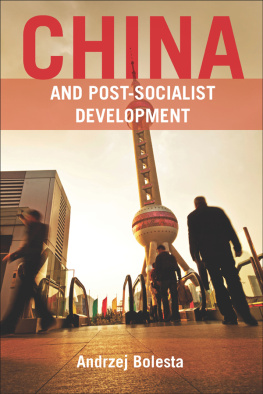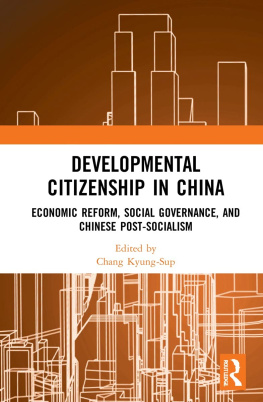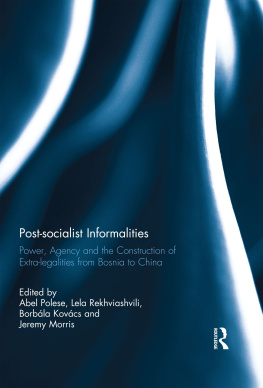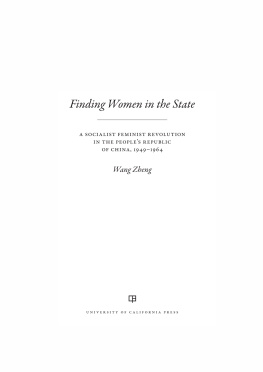CHINA AND POST-SOCIALIST
DEVELOPMENT
Andrzej Bolesta
First published in Great Britain in 2015 by
Policy Press University of Bristol 1-9 Old Park Hill Bristol BS2 8BB UK Tel +44 (0)117 954 5940 e-mail
North American office: Policy Press c/o The University of Chicago Press 1427 East 60th Street Chicago, IL 60637, USA t: +1 773 702 7700 f: +1 773-702-9756
Policy Press 2015
British Library Cataloguing in Publication Data
A catalogue record for this book is available from the British Library
Library of Congress Cataloging-in-Publication Data
A catalog record for this book has been requested
ISBN 9781447323495 ePub
ISBN 9781447323501 Kindle
The right of Andrzej Bolesta to be identified as author of this work has been asserted by him in accordance with the Copyright, Designs and Patents Act 1988.
All rights reserved: no part of this publication may be reproduced, stored in a retrieval system, or transmitted in any form or by any means, electronic, mechanical, photocopying, recording, or otherwise without the prior permission of Policy Press.
The statements and opinions contained within this publication are solely those of the author and not of the University of Bristol or Policy Press. The University of Bristol and Policy Press disclaim responsibility for any injury to persons or property resulting from any material published in this publication.
Policy Press works to counter discrimination on grounds of gender, race, disability, age and sexuality.
Cover design by Policy Press Front cover image: istock
Readers Guide
This book has been optimised for PDA.
Tables may have been presented to accommodate this devices limitations.
Image presentation is limited by this devices limitations.
To Drussilla and Zachary
with all my love
Contents
List of tables and figures
Tables
Figures
About the author
Andrzej Bolesta was educated at the London School of Economics and Political Science, where he obtained his PhD in the Department of Government, and at the University of Oxford, where he received his Masters degree. For the last eight years he has lived in East Asia, most of this time in Beijing, China, where he was responsible for economic affairs at the Polish embassy. During his term Poland and China established a strategic partnership. Prior to this, he lectured at a university in Poland, was advisor on international affairs to the Speaker of the Parliament and a research assistant to one of the architects of Polands post-socialist economic transformation. In 2006 he authored the first book on post-Mao Chinas economy in the Polish language. He currently works in Bangkok, Thailand, where, among other duties, he is involved in the economic transformation of Myanmar.
Acknowledgements
This book would not have been possible were it not for the support, advice and constructive criticism of many people with whom I have had the pleasure and honour to cooperate, and to whom I am very grateful. First and foremost is Dr Chun Lin from the London School of Economics and Political Science, a friend and a mentor, whose guidance and support enabled me to develop my research on Chinas development into a concrete shape and form. I cherish my friendship with Chun and feel privileged to have worked with her. I am also grateful to Professor Shaun Breslin (the University of Warwick) and Dr Tat Yan Kong (School of Oriental and African Studies, University of London), for their extensive comments and insightful suggestions.
My first trip to China took place shortly after the death of Deng Xiaoping. Soon after, I developed my interest in Chinas economy and development, working as a research assistant to one of the architects of Polands post-socialist economic transformation, former Deputy Prime Minister and Minister of Finance Professor Grzegorz W. Kolodko, who encouraged me to delve deeper into this fascinating topic and to question commonly accepted truths, for which I am very grateful. While living in China, I had the great fortune to cooperate with Ambassador Krzysztof Szumski, who, as an outstanding diplomat with 40 years of experience, was able to add a new dimension to my research and created conditions for me to study China in greater detail.
I would like to thank Policy Presss editorial team, in particular, Laura Vickers and Emily Watt, and commend them on their courage in taking on board an unknown scholar from Central Europe. I am also grateful to the anonymous referees for their positive reviews and recommendations, which enriched the manuscript.
Last, but not least, I would like to thank my wife Drussilla, a person who has lived in China, who knows China and who understands China. Without her support, this book would literally not have come to fruition. I benefited immensely from her comments, suggestions and help. Dru has read every single word of this manuscript many times over. It is to her and to our son Zachary that I dedicate this book
Introduction
In the course of economic history, various civilisations have risen and fallen and the gravity of mankinds socio-economic development has shifted from one region to another. In the modern era, up until the 19th century, China was the largest economy in the world and Adam Smith would see it more appropriate to compare the Chinese economy with that of the whole of Europe, rather than separate European states. Maddison (2007) claimed that China owed its position to the intensive economic growth between the seventh and the 13th centuries, and that this was attributable to the development of an intensive and sophisticated agrarian production sector, to the creation of an internal market to trade goods, and to the well-organised and effective state supported by a highly qualified state bureaucracy. At least until the end of the 15th century, Chinas civilisation was considered to be more advanced than that of Europe. Smith pointed out in 1776 that no other country has yet arrived at this degree of opulence [and that] China had probably long ago acquired that full complement of riches (Smith, 2003 [1776], p 132).
Nevertheless, the overall progress of mankind in terms of socioeconomic development in the first 18 centuries AD was relatively slow as compared with the subsequent time periods. It is estimated that the aggregated output of the worlds economy between year 1 and 1000 did not increase at all, and between 1000 and 1800 increased by a meagre 50%, with an average annual economic growth of 0.05% (Kolodko, 2008, pp 68, 70).
The consequences of the Industrial Revolution of the late 18th and early 19th centuries, preceded by 300 years of pre-capitalist development that had commenced with the Renaissance epoch in Europe, allowed for a significant acceleration of socio-economic development and subsequently firmly established the representatives of the so-called Western world as the leaders of developmental advancements, first, the UK, then the US, Germany and other European countries. The Industrial Revolution marks perhaps the establishment of the first effective developmental model of the modern era. This model was characterised by capital-driven economic expansion. The capital was generated through an increase in production, enabled by technological advancements. At the same time, economic expansion was facilitated by military means. China seemed not to be affected by the Industrial Revolution and, as a consequence, the developmental rift between Europe and the Middle Kingdom continued to increase. It is believed that the initial waves of Industrial Revolution failed to have an effect on China, otherwise a relatively well-developed state with well-educated elites and efficient bureaucracy, because of its 300-year policy of isolationism, which limited the diffusion of foreign technologies, domestic incentives for modernisation and the effective exchange of ideas related to economic policies. The militarist model of capitalist development of Western Europe was soon to affect the political situation in China, which, as a result of several wars and domestic rebellions, became a semi-colonial state with 92 treaty ports with extraterritorial rights. For example, 19 foreign nationalities residing in the treaty ports were granted effective diplomatic immunity from Chinese legal jurisdiction (Maddison, 2007; see also Brinkley, 1904).











